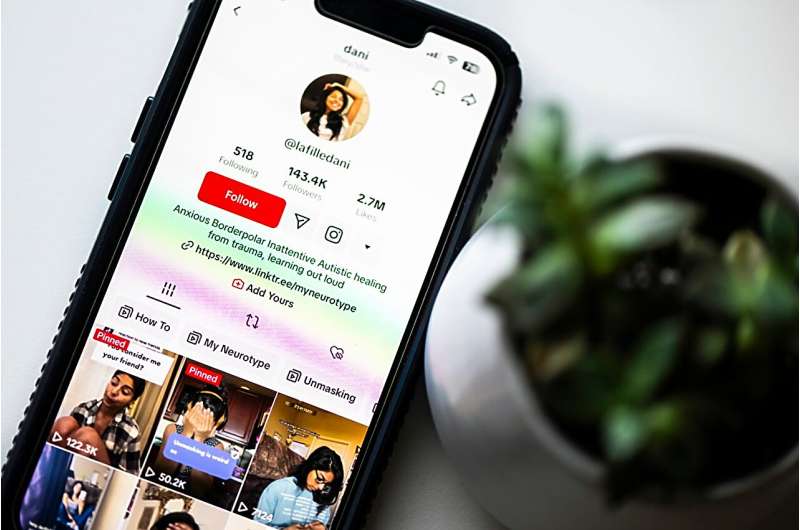This article has been reviewed according to Science X's editorial process and policies. Editors have highlighted the following attributes while ensuring the content's credibility:
fact-checked
peer-reviewed publication
trusted source
proofread
Is TikTok helping autistic people self-diagnose? New research shows role app plays in diagnosis

TikTok has increasingly become a space where people can find not only new recipes and dances but mental health advice. The app's massive popularity among young people has also spawned concerns that teens are diagnosing themselves with autism, ADHD and depression based on the videos they watch on TikTok.
New research from a team at Northeastern University shows how teens are using the app to discuss and reflect on their autism diagnosis, learn more about autism and, in some cases, themselves and their own undiagnosed autism. Meryl Alper, associate professor of communication studies and lead on the research, says #autisktok complicates the idea that an official diagnosis is the end all be all for people. The research is published in the journal New Media & Society.
"The purpose of this study was to understand how discussions of autism diagnosis are occurring on TikTok and the potentially unexpected ways in which those discussions might speak back to institutional and clinical authorities who have their own kinds of discussions about diagnosis that might not necessarily align with the interests, beliefs and motivations of autistic or people who question that they are autistic," Alper says.
The research is, in part, an extension of the work Alper started in her most recent book, "Kids Across the Spectrums: Growing Up Autistic in the Digital Age." Alper and her team focused both on the videos that autistic people were posting but also the comments attached to those videos.
Sometimes people posted about their diagnosis or the process of getting a diagnosis, which can be challenging due to limited access to health care or clinical and societal biases toward autism, according to the researchers. Those common barriers make TikTok a safe space for autistic people to discuss the validity of self-diagnosis, sometimes as a precursor to an official diagnosis.
For others, the videos and discussion on TikTok, including educational information, convinced them and made them more comfortable to receive a diagnosis.
The discussions Alper and her team saw on #autisktok showed a community of people creating an extended network of diagnostic tools that go beyond a clinical diagnosis.
"It's a really open discussion about whether you need an official diagnosis to claim that identity," Alper says. "Do you have a sense of this, and then does even that sense of who you are shape how you go through the world? It might not get you accommodations in class, but it might give you a sense of affinity or this explanatory process of looking back on your life [and making] you feel better or more whole."
TikTok's role as a diagnostic tool is complicated, Alper admits. Unlike a traditional clinical diagnosis, TikTok is providing a new kind of "platformed diagnosis" where people's self-reflection is mediated not only by their experiences but by an algorithm.
"For people who may have never thought that they had ADHD or autism, or maybe they had, it is being gently or sometimes not so gently put in front of them, and that then is generating a kind of reflective work," Alper says. "At the same time [it's] not just as an individual but with other people at the same time who are doing that kind of reflective work in the comment section."
The TikTok "For You" page is an algorithmic collection of videos based on the user's behavior and people in their social network. Alper says it's helped people find the #actuallyautistic community, but it also raises some concerns about how people form their identity—or get their identity formed—on TikTok.
"How well does the algorithm know me?" Alper says. "What do I think about the me that this algorithm thinks I am? And do I need to change the me that I'm presenting so that the algorithm will show me something different?"
The researchers point to how the app can potentially "out" a person as autistic or suggest that they are based on their video feed or even result in pseudo-diagnosis for people who aren't even looking for it. Alper says she hopes this project can start to widen the conversation around the ethics and biases of algorithms when it comes to neurodivergence and neurodiversity.
Alper is adamant that this research is not designed to judge whether what's happening on TikTok is a net positive or negative for youth in America. But she does believe looking at these conversations about self-diagnosis without "the morality lens and the panic-driven agenda" can hopefully start to open up space for a deeper conversation about the value of a diagnosis.
"How can we have a discussion around self-diagnosis that isn't moralizing, that isn't panic-driven?" Alper says. "Diagnosis isn't just one single event. It's a process, in the same way that understanding who you are is not one single thing. It's continually in motion."
More information: Meryl Alper et al, TikTok as algorithmically mediated biographical illumination: Autism, self-discovery, and platformed diagnosis on #autisktok, New Media & Society (2023). DOI: 10.1177/14614448231193091





















